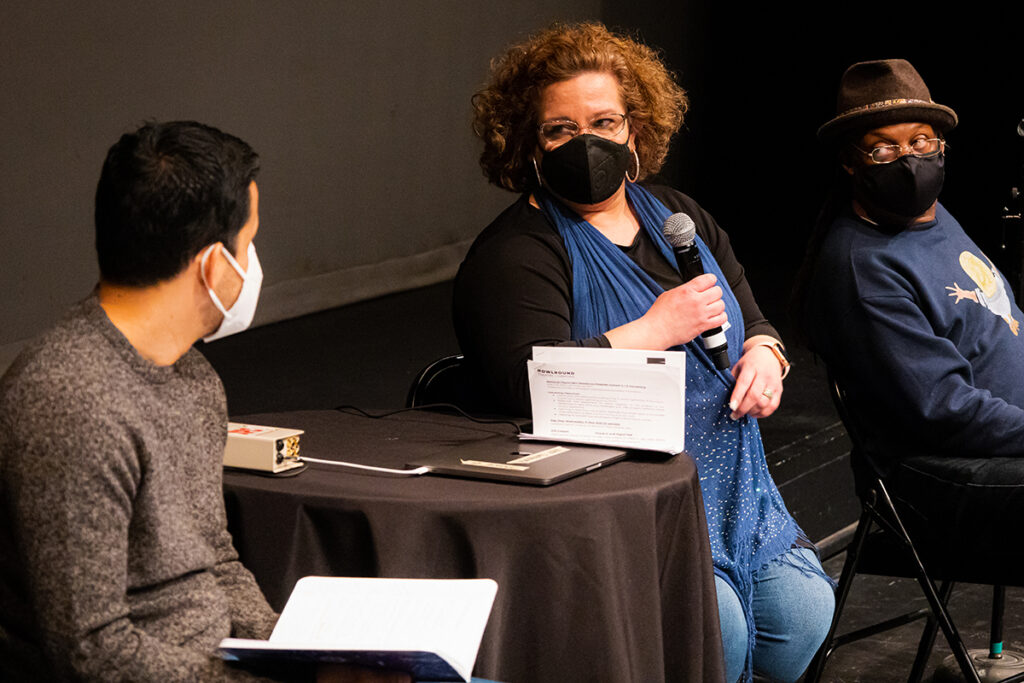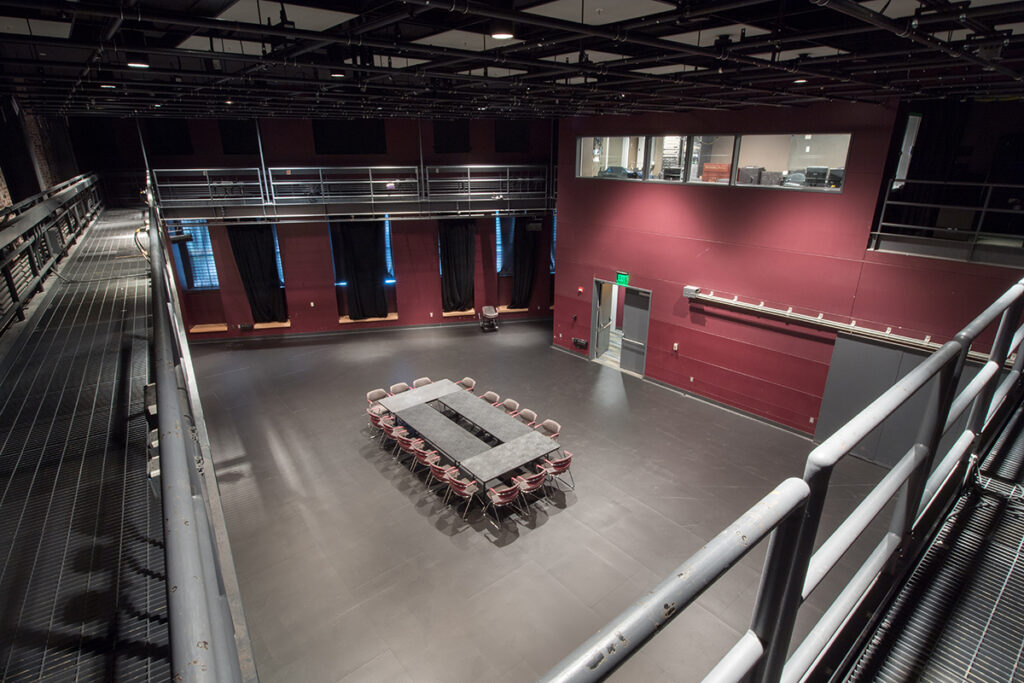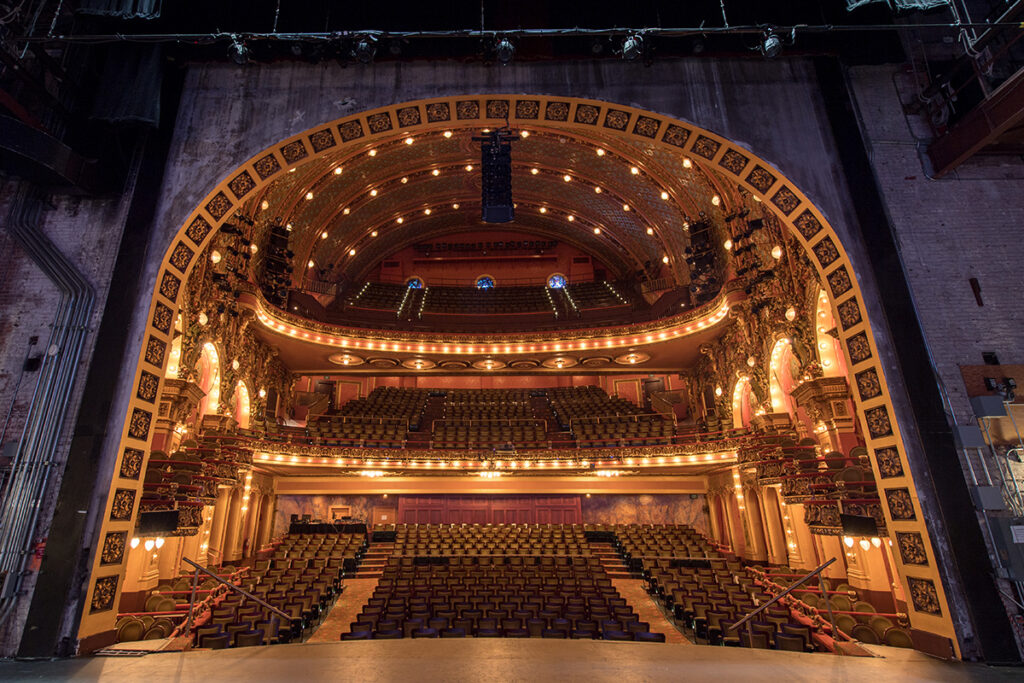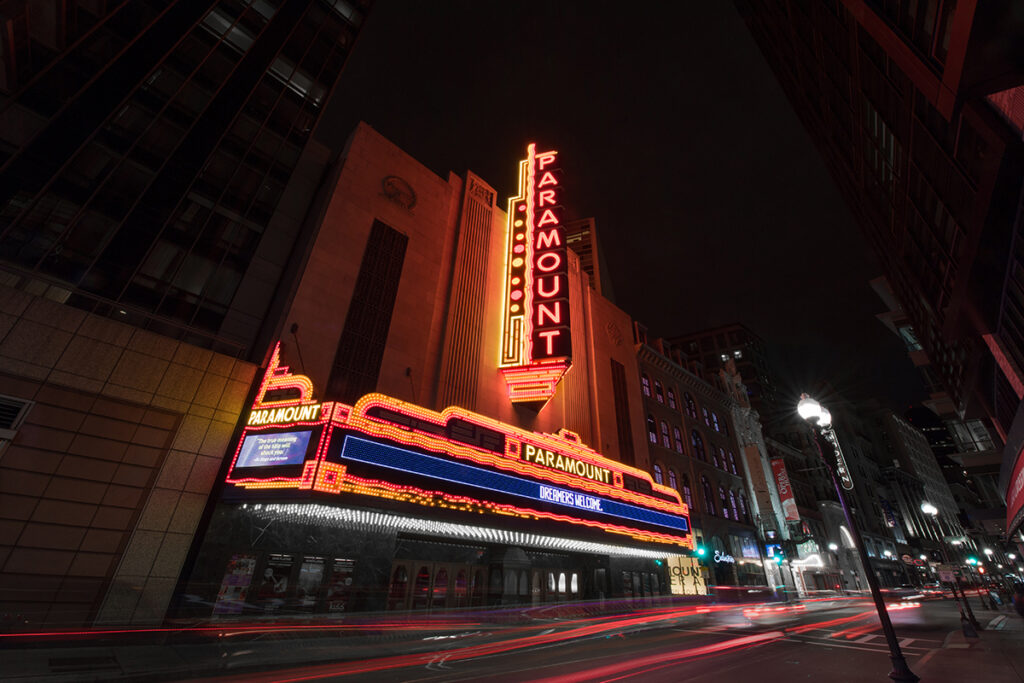HowlRound Residency Puts Playwrights in the Limelight

On a Wednesday afternoon in June, three playwrights sat around a table in an empty black box theatre at the Paramount poring over lines in Hamlet, massaging Shakespeare’s longest play into a more modern, more accessible vernacular.
They had the whole week to work on it, free of obligations, deliverables, or interruptions (Emerson Today reporter excepted), thanks to their participation in the National Playwright Residency Program (NPRP), a grant offered by the Mellon Foundation, in partnership with HowlRound Theatre Commons, part of Emerson’s Office of the Arts.
“So far, it’s fruitful, and I think that some of the conversations we’ve already started having are exciting,” said Mildred Ruiz-Sapp, one of the three playwrights, and co-founder/co-artistic director of the national theatre ensemble UNIVERSES. As a recipient of the NPRP grant, UNIVERSES was in residence at Long Wharf Theatre in Connecticut for the past three years.
The translation, commissioned by Play On Shakespeare, which began as a program of the Oregon Shakespeare Festival, is just one facet of a larger project around Hamlet that UNIVERSES is beginning work on. Likewise, the weeklong HowlRound residency is just one piece of the larger NPRP partnership, which was launched 10 years ago to address a persistent structural problem in the theatre world – the tremendous difficulty playwrights have in earning a living.
The Problem
Theatre-making is financially challenging for virtually everyone involved, but it’s particularly difficult for playwrights and other artists who are paid per show: actors, designers, stage managers, etc., said Jamie Gahlon, HowlRound director and co-founder. And even among these “pieceworkers,” playwrights have a heavier financial lift, because whereas actors and designers could work on multiple shows in a year, playwrights – if they’re very successful and lucky – might see one of their plays produced for an audience in that time.
Playwrights may work on spec, or they get a mix of commissions, Gahlon said. These could include one-off readings or development opportunities, but very often those commissions don’t lead to a full production. Even in cases where a play is produced by a sizeable theatre and the playwright gets royalties, in the end, the money isn’t commensurate with the number of hours and mental labor invested, she said.

The NPRP grant program arose from two studies: Todd London’s Outrageous Fortune: The Life and Times of the New American Play, and “The Gates of Opportunity,” by David Dower, former Office of the Arts Vice President and ArtsEmerson artistic director, and HowlRound co-founder.
“What those reports said was even playwrights who are, by all measures of the field, just wildly successful, are oftentimes still not able to make a living doing this work,” Gahlon said. “And so part of what this program is trying to do is address some of the structural issues in our field around how we compensate the artist whose work it is that makes everything else possible.”
The Approach
Playwrights apply for the NPRP program together with a theatre with whom they have a pre-existing relationship. The grant is for three years, renewable for a second three-year period, and, in addition to compensating them for their work, guarantees the playwright at least one full production of their plays for each term of the grant. Those productions could be pieces they’ve already started going into the program, or something new they’ve created from start to finish.
But the program isn’t primarily a vehicle to get a play on a stage.
“It’s about really supporting the full body of what they are trying to work on over this period of time,” Gahlon said.
For its part, HowlRound offers grant recipients a weeklong developmental residency on Emerson’s campus, where playwrights are free to work on anything they choose. They can use the week to do research, write, or workshop a show. Because HowlRound isn’t a producing theatre, it doesn’t ask artists to deliver anything after the week is up.
“It’s entirely driven by what the artist wants to do,” Gahlon said. “It doesn’t even have to be the thing that they’re necessarily working on next with their home theater, it’s whatever they feel is going to be most useful to them in their creative process.”
Beyond the residencies, HowlRound administers a $30,000 professional development fund for each grant recipient over the course of the three-year grant, again, to be used however they feel will be most useful, and documents the impact of the program via journals, articles, and live streams.

The Impact
In an NPRP assessment commissioned by HowlRound, the investigators found evidence that the program has had positive effects, both on the playwrights who went through the residency and the theaters supporting them.
Without the stressors of gig work and one-off commissions hanging over them, playwrights felt freer to experiment and take artistic risks, according to the report, and they felt like they had more agency over their work. The theaters reported that having a playwright on staff enriched their artistic processes and decision making, and deepened relationships not just with the playwrights, but with other artists involved in productions and the communities they speak to.
The report also found that the work produced under the auspices of NPRP contributes to a wider trend within the field of opening theatre up to more diverse voices and audiences. Theater still is dominated by “white, older, wealthy subscribers,” who traditionally have dictated what shows are produced.
“The artistic preferences of these traditional audiences are often misaligned with what younger, queer, and/or BIPOC playwrights want to write and with what younger, queer, and/or BIPOC audiences want to see,” according to the report. “Many NPRP playwrights commented that they feel caught between writing what they want to write (or what they know will appeal to their own community) and creating work that will be ‘successful’ in larger, predominantly white theatre spaces.”
The National Playwright Residency Program is open to any playwright who wants to develop their craft, produce good work, and earn a living wage doing it, but Gahlon said the panel of field practitioners who make funding recommendations place a high priority on supporting writers from diverse backgrounds.
“Playwrights from historically marginalized communities are produced at a lower level … plays by White men are grossly over-represented on stages consistently,” she said. “There’s been some very small gains for women in recent years, but it’s all still very much a live and important conversation that the theatre is having around how we actually tell the stories on our stages that reflect the fullness of who we are.”

UNIVERSES
Back at the Paramount, Ruiz-Sapp, her husband and UNIVERSES co-founder and artistic director Steven Sapp, and her brother, actor/playwright William Ruiz (aka Ninja) were negotiating Shakespeare, a writer they know well, having been the ensemble-in-residence at the Oregon Shakespeare Festival from 2013-2018, and, like Will, being poet/playwrights themselves.
“We are Shakespearean actors and performers, and we’ve lived Shakespeare’s plays, and to have this opportunity right now as poet/playwrights, to dive into the work, is exciting,” Ruiz-Sapp said.
The translation they were working on for Play On Shakespeare was more of an “intellectual exercise.” But they’re also envisioning an adaptation of Hamlet that falls in line with the work that UNIVERSES is better known for: a fusion of “theater, poetry, dance, jazz, hip hop, politics, down home blues and Spanish boleros,” as their website puts it.
“I think the adaptation is really kind of taking the whole world [of Hamlet] and flipping it inside out and hearing it the way we sometimes hear work,” Steven said.
The themes in Shakespeare are timeless and cross cultures, but UNIVERSES hopes to transport Hamlet to this time, to their place and community.
“So much has happened since it was initially created that we can now just re-envision the entire thing and still deal with the struggles of the mind, which is what Hamlet is dealing with,” Ruiz-Sapp said. “What are the struggles of the mind nowadays? What’s the chaos in our own minds that we would explore?”
Their residency at HowlRound afforded them the time and space to sit together and explore, if not the chaos in their minds, at least some heady ideas. But it was just the start.
“It takes any playwright a long time to create a play. Usually, you expect two to three years of a process, and that’s true of any playwright,” Ruiz-Sapp said. “[T]his is the very beginning of the conversation of what we can do with Hamlet, and it’ll take us a while and many residencies and many thoughts and ideas and scrapping of this, that, and the other and re-imagining it along the way.”
Categories